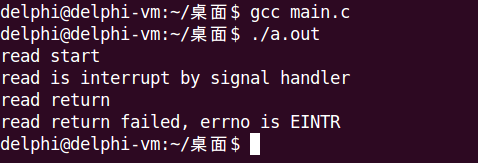慢系統調用,指的是可能永遠無法返回,從而使進程永遠阻塞的系統調用,比如無客戶連接時的accept、無輸入時的read都屬於慢速系統調用。 在Linux中,當阻塞於某個慢系統調用的進程捕獲一個信號,則該系統調用就會被中斷,轉而執行信號處理函數,這就是被中斷的系統調用。 然而,當信號處理函數返回時,有可 ...
慢系統調用,指的是可能永遠無法返回,從而使進程永遠阻塞的系統調用,比如無客戶連接時的accept、無輸入時的read都屬於慢速系統調用。
在Linux中,當阻塞於某個慢系統調用的進程捕獲一個信號,則該系統調用就會被中斷,轉而執行信號處理函數,這就是被中斷的系統調用。
然而,當信號處理函數返回時,有可能發生以下的情況:
- 如果信號處理函數是用signal註冊的,系統調用會自動重啟,函數不會返回
- 如果信號處理函數是用sigaction註冊的
- 預設情況下,系統調用不會自動重啟,函數將返回失敗,同時errno被置為EINTR
- 只有中斷信號的SA_RESTART標誌有效時,系統調用才會自動重啟
下麵我們編寫代碼,分別驗證上述幾種情形,其中系統調用選擇read,中斷信號選擇SIGALRM,中斷信號由alarm產生。
使用signal
#include <stdio.h>
#include <signal.h>
#include <unistd.h>
#include <errno.h>
void handler(int s)
{
printf("read is interrupt by signal handler\n");
return;
}
int main()
{
char buf[10];
int nread = 0;
signal(SIGALRM, handler);
alarm(2);
printf("read start\n");
nread = read(STDIN_FILENO, buf, sizeof(buf));
printf("read return\n");
if ((nread < 0) && (errno == EINTR))
{
printf("read return failed, errno is EINTR\n");
}
return 0;
}
使用sigaction + 預設情況
#include <stdio.h>
#include <signal.h>
#include <unistd.h>
#include <errno.h>
void handler(int s)
{
printf("read is interrupt by signal handler\n");
return;
}
int main()
{
char buf[10];
int nread = 0;
struct sigaction act;
sigemptyset(&act.sa_mask);
act.sa_handler = handler;
act.sa_flags = 0; //不給SIGALRM信號設置SA_RESTART標誌,使用sigaction的預設處理方式
//act.sa_flag |= SA_INTERRUPT; //SA_INTERRUPT是sigaction的預設處理方式,即不自動重啟被中斷的系統調用
//實際上,不管act.sa_flags值為多少,只要不設置SA_RESTART,sigaction都是按SA_INTERRUPT處理的
sigaction(SIGALRM, &act, NULL);
alarm(2);
printf("read start\n");
nread = read(STDIN_FILENO, buf, sizeof(buf));
printf("read return\n");
if ((nread < 0) && (errno == EINTR))
{
printf("read return failed, errno is EINTR\n");
}
return 0;
}
使用sigaction + 指定SA_RESTART標誌
#include <stdio.h>
#include <signal.h>
#include <unistd.h>
#include <errno.h>
void handler(int s)
{
printf("read is interrupt by signal handler\n");
return;
}
int main()
{
char buf[10];
int nread = 0;
struct sigaction act;
sigemptyset(&act.sa_mask);
act.sa_handler = handler;
act.sa_flags = 0;
act.sa_flags |= SA_RESTART; //給SIGALRM信號設置SA_RESTART標誌
sigaction(SIGALRM, &act, NULL);
alarm(2);
printf("read start\n");
nread = read(STDIN_FILENO, buf, sizeof(buf));
printf("read return\n");
if ((nread < 0) && (errno == EINTR))
{
printf("read return failed, errno is EINTR\n");
}
return 0;
}
由於對被中斷系統調用處理方式的差異性,因此對應用程式來說,與被中斷的系統調用相關的問題是:
- 應用程式無法保證總是知道信號處理函數的註冊方式,以及是否設置了SA_RESTART標誌
- 可移植的代碼必須顯式處理關鍵函數的出錯返回,當函數出錯且errno等於EINTR時,可以根據實際需求進行相應處理,比如重啟該函數
int nread = read(fd, buf, 1024);
if (nread < 0)
{
if (errno == EINTR)
{
//read被中斷,其實不應該算作失敗,可以根據實際需求進行處理,比如重寫調用read,也可以忽略它
}
else
{
//read真正的讀錯誤
}
}


